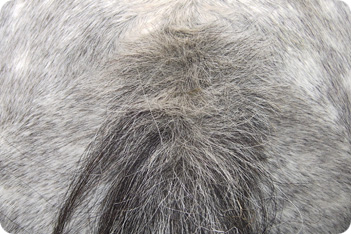

Sweet Itch
Sweet Itch, which is also known as summer itch and summer pruritus and recurrent seasonal dermatitis is an allergic reaction to biting Culicoides midges.
Sweet Itch often occurs between the months of April through to October, although in some countries horses can be affected year round if conditions are in the midges favour.
Symptoms Of Sweet Itch
There are several symptoms that can occur:
- Horses affected will try to persistently itch areas that are affected, which is often around the ears, face, tail and mane.
- The skin often has ridges form in areas that are constantly rubbed.
- Skin surface is often broken.
- Weeping skin sores may also be present.
- Hair loss occurs due to excessive scratching, which can cause bald areas to form.
- Skin becomes thicker in areas that are constantly rubbed
- Horse may become lethargic and depressed.
- Horse may be sensitive or irritable when being touched.
- Horse may also constantly swish their tail.
Horses Affected
All horses and ponies can be affected by sweet itch with grey's being particularly vulnerable.
Sweet Itch Treatment
There is at present no cure for Sweet Itch it is a condition that needs careful management to help keep the horses discomfort to a minimum.
- Insect Repellents
The use of insect repellents can prove beneficial if regularly applied. - Sweet Itch Rug
There are several fly rugs available such as the Boett Rug that help to cover and protect your horses skin from biting insects. - Location
Where you turn your horse can also help reduce the severity of the condition, for example avoid low level areas that are close to streams, ponds and muck heaps. Ideally choose high turnout ground with limited access to areas that the horse may rub against. - Topical Creams
There are several creams that can be applied to sore areas that have been rubbed which can help to reduce itching and soothe the skin. - Antihistamines
In severe sweet itch cases, your vet may administer an antihistamine to help reduce the symptoms of the sweet itch. - Corticosteroids
Corticosteroid injections can help suppress the symptoms, however the long term use of steroid injections can in some cases have side affects such as inducing episodes of laminitis, so you will need to ask your veterinary on your horses suitability for these injections. - Stabling
Stabling your horse at dawn and dusk when the midges are at there most active can also greatly help. - Shampoo
When bathing your horse use an insecticidal shampoo. - Sweat
Ensure that after exercise your horse is properly sponged off to remove sweat from the skin which attracts biting insects.